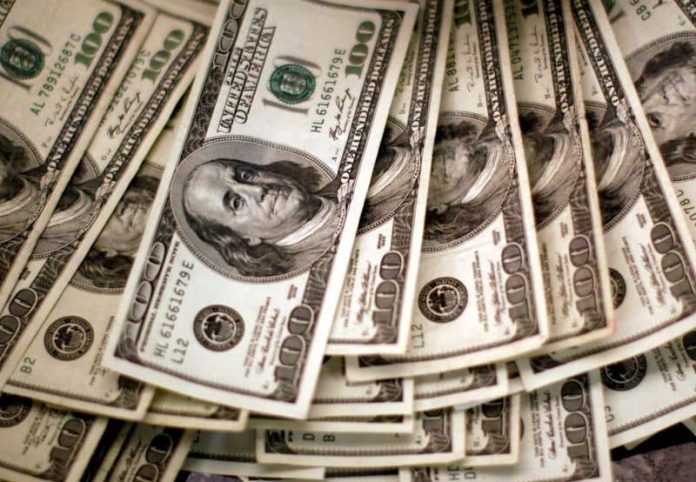By Samuel Indyk and Rae Wee
LONDON (Reuters) – The dollar drifted near a 15-month low against its major peers on Tuesday, as investors awaited fresh catalysts to gauge for downside in the wake of last week’s cooler-than-expected U.S. inflation.
The U.S. dollar index, which measures the greenback against a basket of six currencies, fell as low as 99.587, languishing near Friday’s trough of 99.574, its lowest since April 2022.
The index had clocked its worst week of 2023 last week, after data showed U.S. inflation subsided further with consumer prices registering their smallest annual increase in more than two years. That took pressure off the Federal Reserve to continue raising interest rates.
Money markets have almost fully priced a 25-basis-point rate hike from the Fed at its policy meeting later this month, but see rates coming down as early as December.
“In the short-term, I’m not sure the dollar can move much further,” said Francesco Pesole, FX strategist at ING.
“Momentum is clearly on the bearish side, but at the same time, it’s starting to look a bit stretched,” Pesole said, noting recent multi-month highs in the euro and sterling.
The common currency hit a fresh 17-month peak of $1.1276 against the dollar in early European trade, with markets largely pricing a 25 bps hike from the European Central Bank when it announces policy on July 27.
But, the outlook for a further rate rise in September is unclear after euro zone economic activity slowed in June.
“When you compound the weak China story, weak euro area growth and the risk of a September pause, markets will come to terms that the euro looks a bit stretched,” ING’s Pesole said.
“If the Fed sounds hawkish as they hike next week, markets might want to reassess euro-dollar lower.”
Elsewhere sterling gained 0.1% to $1.3083, not far from last week’s top of $1.3144, its highest since April 2022.
The Japanese yen rose about 0.4% to 138.155 per dollar, as investors look to the Bank of Japan’s (BOJ) monetary policy meeting next week for a potential phasing out of its ultra-dovish policy stance.
“More market participants have priced in chances of BOJ widening its yield curve control policy’s trading band by 25 bps in the next meeting,” said Ryota Abe, an economist at SMBC.
The Australian dollar was last 0.1% lower at $0.6811 after minutes of the Reserve Bank of Australia’s (RBA) July policy meeting released on Tuesday provided no major surprises on the rate outlook.
“The RBA minutes… did not contain much new information from Governor Lowe’s (NYSE:LOW) recent speech, where he seemed less definitive on the need for further rises and more attuned to potential growth risks,” said Tapas Strickland, head of market economics at National Australia Bank (OTC:NABZY).
“This tone was arguably reflected in the minutes, though there was a strong case presented for further tightening.”
The New Zealand dollar fell 0.3% to $0.6308, with both Antipodean currencies nursing losses from the previous session driven by data from China.
The country’s economy grew at a frail pace in the second quarter as demand weakened at home and abroad.
China’s top economic planner pledged on Tuesday that it would roll out policies to “restore and expand” consumption without delay as consumers’ purchasing power remained weak.
The onshore yuan was flat and last bought 7.1729 per dollar, after the People’s Bank of China set a firmer-than-expected daily mid-point.



















